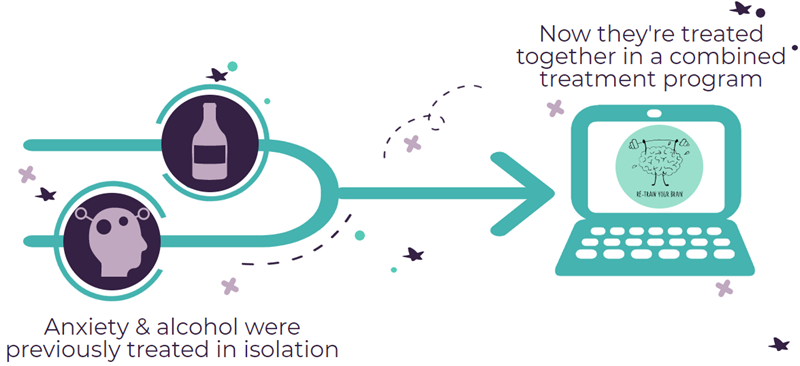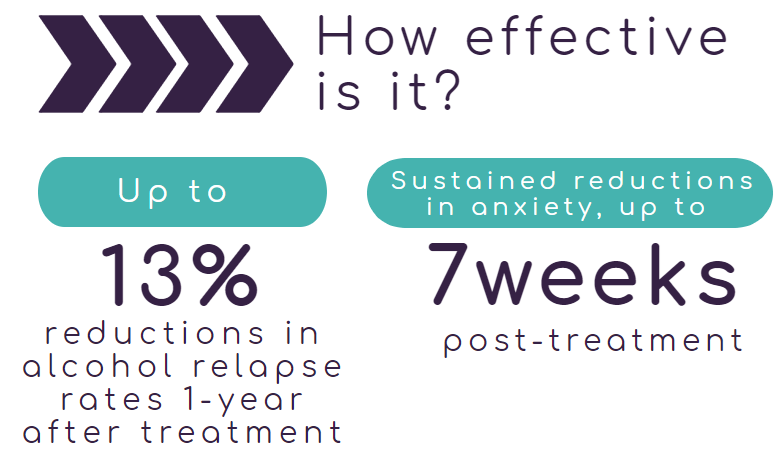What is the science behind the Re-Train Your Brain program?

Why is the Re-Train Your Brain study needed?
When anxiety and alcohol use problems co-occur, they fuel each other in a vicious cycle, leading to greater severity and impairment (e.g., people drink to reduce anxiety in the short term, however the consequences of drinking, such as withdrawal, lead to greater anxiety in the long term and increase the risk of alcohol use disorders). Novel and complementary treatment approaches that enhance existing clinic-based treatments are urgently needed to address these co-occurring conditions.
The Re-Train Your Brain program is a hybrid Cognitive Bias Modification program comprised of two separate, evidence-based brain training computer tasks; one for anxiety and the other for alcohol. These brain training programs are usually tested in isolation, in research laboratories. Our team is interested in creating a cost-effective and accessible add-on treatment for young people experiencing both anxiety and alcohol use problems, and are thus developing a combined anxiety-alcohol program that can be delivered over the internet to broaden its reach and impact.
What are cognitive biases?
Cognitive biases affect everyone. They are a type of error in thinking that occurs when people are processing and interpreting information in the world around them. This affects the decisions and judgments that people make. Cognitive biases are often a result of the brain's attempt to simplify information processing by using mental shortcuts that allow you to act quickly. Unfortunately, these biases sometimes trip us up, leading to poor decisions and bad judgments.
What do we know about cognitive biases and their association with anxiety and alcohol use problems?
Both anxiety and alcohol use have underlying cognitive biases that maintain and worsen their respective symptoms, but they have largely been examined separately. For example, studies have found that problem drinkers have an implicit tendency to approach (rather than avoid) alcohol and people with heightened anxiety have an implicit tendency to interpret ambiguous information in a catastrophic or threatening manner and often try to quickly escape from anxious feelings by drinking alcohol.
Can we change these harmful cognitive biases?
Yes, new cutting-edge cognitive re-training programs have been developed, known as Cognitive Bias Modification. Cognitive Bias Modification (CBM) directly modifies alcohol-approach and anxiety-related interpretation biases via repeated practice on online cognitive tasks. By giving people lots of practice processing information in new ways, Cognitive Bias Modification helps people develop mental strength and skills to manage anxiety and make positive choices about their alcohol use. These tasks may seem repetitive, and it is not always obvious what the program is doing.
What evidence is there supporting the effectiveness of Cognitive Bias Modification?
Cognitive Bias Modification can be delivered in the lab, in the clinic or online, and is commonly provided as an adjunct to standard face-to-face treatments such as Cognitive Behavioural Therapy.
Cognitive Bias Modification for alcohol approach biases is aimed at training adaptive, healthy alcohol avoidance tendencies. When used as an add-on to standard alcohol treatment (such as cognitive behavioural therapy, detoxification or inpatient rehabilitation programs), Cognitive Bias Modification for alcohol has shown significant reductions in alcohol use and up to 13% reductions in alcohol relapse rates 1-year following treatment.
Cognitive Bias Modification for anxiety-related interpretation biases is aimed at training positive interpretations of ambiguous social and performance scenarios [1-5]. Cognitive Bias Modification for anxiety has resulted in significant reductions in in anxiety (state, trait, social anxiety, and worry) and general psychopathology, with sustained effects up to 7 weeks post-treatment [6-12].

The need for research
Although there are many examples of Cognitive Bias Modification programs helping to reduce anxiety and alcohol use, and even helping other problem areas like depression, drug use, cigarette smoking, eating disorders, and anger problems, there are also some mixed findings. Not all studies using these approaches get the same results, and some studies find decreases in one anxiety/alcohol measure but not another. Also, more research needs to be done to find the optimal number of training sessions, and to figure out how to make Cognitive Bias Modification as effective if completed online as in the clinic or lab. Though there are still open questions, one goal of this study is to work on answering these questions in order to refine and improve this promising treatment method.
Resources
Below are a few resources if you’re interested in learning more about Cognitive Bias Modification or the research supporting it:
References
- Eberl, C., Wiers, R. W., Pawelczack, S., Rinck, M., Becker, E. S., & Lindenmeyer, J. (2013). Approach bias modification in alcohol dependence: do clinical effects replicate and for whom does it work best? Dev Cogn Neurosci, 4, 38-51. doi:10.1016/j.dcn.2012.11.002
- Manning, V., Staiger, P. K., Hall, K., Garfield, J. B., Flaks, G., Leung, D., . . . Verdejo-Garcia, A. (2016). Cognitive Bias Modification Training During Inpatient Alcohol Detoxification Reduces Early Relapse: A Randomized Controlled Trial. Alcohol Clin Exp Res, 40(9), 2011-2019. doi:10.1111/acer.13163
- Kakoschke, N., Kemps, E., & Tiggemann, M. (2017). Approach bias modification training and consumption: A review of the literature. Addict Behav, 64, 21-28. doi:10.1016/j.addbeh.2016.08.007
- Wiers, R. W., Rinck, M., Kordts, R., Houben, K., & Strack, F. (2010). Retraining automatic action-tendencies to approach alcohol in hazardous drinkers. Addiction, 105(2), 279-287. doi:10.1111/j.1360-0443.2009.02775.x
- Wiers, R. W., Eberl, C., Rinck, M., Becker, E. S., & Lindenmeyer, J. (2011). Retraining Automatic Action Tendencies Changes Alcoholic Patients’ Approach Bias for Alcohol and Improves Treatment Outcome. Psychological Science, 22(4), 490-497. doi:10.1177/0956797611400615
- Bowler, J. O., Mackintosh, B., Dunn, B. D., Mathews, A., Dalgleish, T., & Hoppitt, L. (2012). A comparison of cognitive bias modification for interpretation and computerized cognitive behavior therapy: effects on anxiety, depression, attentional control, and interpretive bias. J Consult Clin Psychol, 80(6), 1021-1033. doi:10.1037/a0029932
- Butler, E., Mobini, S., Rapee, R. M., Mackintosh, B., & Reynolds, S. A. (2015). Enhanced effects of combined cognitive bias modification and computerised cognitive behaviour therapy on social anxiety. Cogent Psychology, 2(1). doi:10.1080/23311908.2015.1011905
- Hirsch, C. R., Hayes, S., & Mathews, A. (2009). Looking on the bright side: accessing benign meanings reduces worry. J Abnorm Psychol, 118(1), 44-54. doi:10.1037/a0013473
- Mathews, A., Ridgeway, V., Cook, E., & Yiend, J. (2007). Inducing a benign interpretational bias reduces trait anxiety. J Behav Ther Exp Psychiatry, 38(2), 225-236. doi:10.1016/j.jbtep.2006.10.011
- Mobini, S., Mackintosh, B., Illingworth, J., Gega, L., Langdon, P., & Hoppitt, L. (2014). Effects of standard and explicit cognitive bias modification and computer-administered cognitive-behaviour therapy on cognitive biases and social anxiety(). Journal of Behavior Therapy and Experimental Psychiatry, 45(2), 272-279. doi:10.1016/j.jbtep.2013.12.002
- Salemink, E., van den Hout, M., & Kindt, M. (2009). Effects of positive interpretive bias modification in highly anxious individuals. Journal of Anxiety Disorders, 23(5), 676-683. doi:https://doi.org/10.1016/j.janxdis.2009.02.006
- Hayes, S., Hirsch, C. R., Krebs, G., & Mathews, A. (2010). The effects of modifying interpretation bias on worry in generalized anxiety disorder. Behav Res Ther, 48(3), 171-178. doi:10.1016/j.brat.2009.10.006